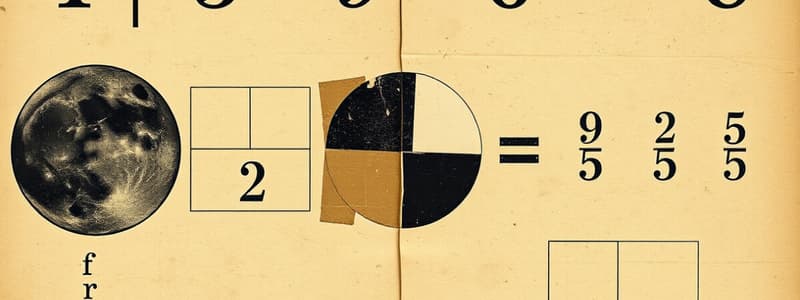Podcast
Questions and Answers
Which statement accurately describes a proper fraction?
Which statement accurately describes a proper fraction?
- The fraction represents a whole number.
- The numerator is less than the denominator. (correct)
- The numerator is greater than the denominator.
- The numerator is equal to the denominator.
When dividing the fractions $\frac{3}{4}$ by $\frac{1}{2}$, what is the first step?
When dividing the fractions $\frac{3}{4}$ by $\frac{1}{2}$, what is the first step?
- Multiply $\frac{3}{4}$ by $\frac{1}{2}$
- Add the two fractions together.
- Find the reciprocal of $\frac{1}{2}$ (correct)
- Find the reciprocal of $\frac{3}{4}$
What form do you convert a mixed number into before dividing it?
What form do you convert a mixed number into before dividing it?
- A simple fraction
- A proper fraction
- A decimal
- An improper fraction (correct)
In the word problem 'You have $\frac{3}{4}$ of a pizza and share it among 3 friends', what is the fraction each friend receives?
In the word problem 'You have $\frac{3}{4}$ of a pizza and share it among 3 friends', what is the fraction each friend receives?
What is the decimal representation of the fraction $\frac{3}{8}$?
What is the decimal representation of the fraction $\frac{3}{8}$?
To divide the mixed number 2 1/3 by the improper fraction 5/2, what is the first step you need to take?
To divide the mixed number 2 1/3 by the improper fraction 5/2, what is the first step you need to take?
How would you express the division of 0.6 by 0.2 using fractions?
How would you express the division of 0.6 by 0.2 using fractions?
What happens when you divide the fraction $\frac{4}{5}$ by the fraction $\frac{2}{3}$?
What happens when you divide the fraction $\frac{4}{5}$ by the fraction $\frac{2}{3}$?
Flashcards are hidden until you start studying
Study Notes
Fractions
- A fraction consists of a numerator (top number) and a denominator (bottom number).
- Types of fractions:
- Proper Fractions: Numerator is less than the denominator (e.g., 3/4).
- Improper Fractions: Numerator is greater than or equal to the denominator (e.g., 5/4).
- Mixed Numbers: Combination of a whole number and a proper fraction (e.g., 2 1/2).
Division of Fractions
- To divide fractions, multiply the first fraction (dividend) by the reciprocal of the second fraction (divisor).
- Steps:
- Find the reciprocal of the divisor (flip numerator and denominator).
- Multiply the dividend by the reciprocal.
- Simplify the result if possible.
- Example: (2/3) ÷ (4/5) becomes (2/3) × (5/4) = 10/12 = 5/6 after simplification.
Mixed Numbers
- To divide mixed numbers:
- Convert mixed numbers to improper fractions.
- Follow the division of fractions procedure.
- Example: 3 1/2 ÷ 1 1/4 is converted to (7/2) ÷ (5/4) = (7/2) × (4/5) = 28/10 = 14/5 or 2 4/5 after simplification.
Word Problems Involving Fractions
- Read the problem carefully to identify the fractions involved.
- Translate the scenario into a mathematical expression.
- Use division of fractions techniques where applicable.
- Example problem: "If you have 3/4 of a pizza and you want to share it among 3 friends, how much pizza will each friend get?"
- Set up as (3/4) ÷ 3 = (3/4) ÷ (3/1) = (3/4) × (1/3) = 1/4.
Decimals
- Decimals are another way to represent fractions with denominators of powers of 10.
- To convert a fraction to a decimal, divide the numerator by the denominator.
- Example: 1/4 = 0.25.
- Division of fractions can also involve converting fractions to decimals for easier computation.
- Example: To divide 0.5 by 0.25, convert to fractions: (1/2) ÷ (1/4) = (1/2) × (4/1) = 4/2 = 2.
Fractions
- A fraction comprises a numerator (top number) and a denominator (bottom number).
- Proper Fractions: Numerator is less than the denominator, e.g., 3/4.
- Improper Fractions: Numerator is greater than or equal to the denominator, e.g., 5/4.
- Mixed Numbers: A combination of a whole number and a proper fraction, e.g., 2 1/2.
Division of Fractions
- Division of fractions involves multiplying the first fraction (dividend) by the reciprocal of the second fraction (divisor).
- Steps for division:
- Find the reciprocal of the divisor by flipping its numerator and denominator.
- Multiply the dividend by the reciprocal.
- Simplify the final result if possible.
- Example: For (2/3) ÷ (4/5), convert it to (2/3) × (5/4) = 10/12, which simplifies to 5/6.
Mixed Numbers
- To divide mixed numbers, convert them into improper fractions first.
- Follow the division process for fractions thereafter.
- Example: 3 1/2 ÷ 1 1/4 converts to (7/2) ÷ (5/4) = (7/2) × (4/5) = 28/10, simplifying to 14/5 or 2 4/5.
Word Problems Involving Fractions
- Carefully read the problem to accurately identify involved fractions.
- Translate the scenario into a relevant mathematical expression.
- Apply division of fractions techniques as appropriate.
- Example: To share 3/4 of a pizza among 3 friends, set up as (3/4) ÷ 3, leading to (3/4) ÷ (3/1) = (3/4) × (1/3) = 1/4 pizza per friend.
Decimals
- Decimals are another representation of fractions with denominators that are powers of 10.
- To convert a fraction to a decimal, divide the numerator by the denominator.
- Example conversion: 1/4 equals 0.25.
- Division involving decimals may also require conversion to fractions for ease of calculation.
- Example: Dividing 0.5 by 0.25 converts to (1/2) ÷ (1/4) = (1/2) × (4/1) = 4/2, which simplifies to 2.
Studying That Suits You
Use AI to generate personalized quizzes and flashcards to suit your learning preferences.



